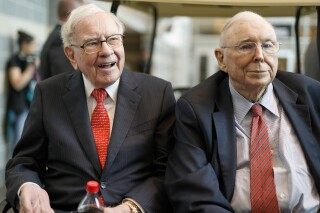We had one of the last big weeks of earnings for the current earnings season. The headline player was Nvidia, which had another amazing report and propelled markets to new highs. I don’t have much to say here about Nvidia, though. Instead, I want to break down Berkshire Hathaway earnings. It released its Q4 earnings report or, more precisely, the company’s annual report. Warren Buffett’s company had another impressive result, and given its unique nature as a company, its results can tell us a lot about the market.
Subscribe to get Middle Coast Investing posts
Later this week, I will post an analysis of Warren Buffett’s shareholder letter. You can subscribe to above to get that when it comes out.
Why we Study Berkshire Hathaway
Before I get started, a quick refresher on the whats and whys. I broke down Berkshire’s Q3 results in a video, and I like to do this not necessarily because I’m a shareholder, though I am. Berkshire is a ‘like the index, but better’ investment for me. Warren himself says Berkshire is unlikely to greatly outperform, due to its size and nature. This post is less about analyzing Berkshire as a stock than as a business.
It’s interesting to study Berkshire as a business because it is a conglomerate, and a huge scale one. We’ll talk about car insurance and other insurance, railroads, electric and natural gas utilities, and gas stations, and we will only get to part of Berkshire’s empire.
It’s also interesting because Buffett is widely considered the greatest investor of all time. His long-time partner, Charlie Munger, died just shy of his 100th birthday last November, but his imprint on Berkshire is also legendary. And that’s valuable to us both because the level of disclosure Berkshire offers on their business is insightful, and because this reflects those two’s business thinking. We can backwards engineer how these guys put all this together and take lessons for our own investing, whether in Berkshire or other stocks.

Warren Buffett and the late great, Charlie Munger. Source: AP
Let’s get into some business takeaways from Berkshire Hathaway’s Annual Report.
Berkshire Hathaway earnings: Insurance Records
Berkshire’s operating earnings rose $6.5B for the year, or 21%. Very impressive. Its insurance business did more than all of that growing.
Underwriting, or how much money the company makes on selling insurance itself, rose $5.5B from a small loss to a $5.4B gain. GEICO was the key driver, pun intended, setting what appears to be an earnings record one year after losing nearly $2B in pre-tax profit. From what I can tell, Berkshire’s other insurance lines also set records.

Boom times for the gecko. Source: GEICO.com
What explains this? There were no major insurance catastrophes that hurt Berkshire’s other, more property or major risk oriented insurance businesses. And GEICO raised prices enough to handle the inflation in paying claims for used cars and so on.
I’ve been watching car insurers closely both because I own Berkshire and Progressive shares, and because it’s emblematic of how inflation affects the economy. Car insurers minted money during the pandemic as fewer people drove or got into accidents (they even returned money to policy holders). Then people started driving worse (increase in claims frequency) and it got much more expensive to repair cars after the fact.
Berkshire reported that claims severity, the inflation bit, was still up for 2023. But compared to Q3, that increase dropped in property damage, bodily injury, and collision. That’s encouraging. Also interesting: GEICO has lost customers as it raises prices and reduces advertising. That drop in policies in force, or customers, was meaningfully less for the full year than the first 9 months. More competition would be a good sign for consumers in pricing and for companies that sell advertising.
The Win-Win of Insurance
You’ll note there’s $1B missing in operating earnings claims from my numbers above. That comes out in insurance investment income. As Buffett has long explained, and as Berkshire puts front in center in a page before its 10-K starts, insurance generates float. We pay premiums up front, and insurance companies pay out claims later. In the meantime, they hold that cash or invest it.
Berkshire’s investments are in stocks (see below) and bonds. You may know that interest rates have gone up. That was a boon to Berkshire, which made $4.4B more in pre-tax interest income. That’s a lot of money for, essentially, doing nothing but lending to the government.
It’s not insightful to say that the insurance business, done well, can be an amazing business. But it is nice to see that proved out again and again in Berkshire’s results.
Problem Children are a Mixed Bag
I’ll get to Mr. Buffett’s letter separately, but he called out the railroad business and the utilities businesses as problems. When we look at the numbers in Berkshire Hathaway earnings, the explanations differ.
Let’s start with railroads, which is Burlington Northern Santa Fe. This appears to be healthier. Shipments of consumer products dropped meaningfully, and the volume is a concern. But the company held onto its pricing, and it appeared to lose its shipments to competition and a lost customer. This isn’t a yellow flag for the broader economy, and looks solvable. Buffett grumbled about wages going up, but at least in the numbers, it didn’t seem to be a flagrant problem. All in all, net earnings dropped about $900M, which is not what you want, but also seems to be a normal pullback.
Utilities is a thornier business. Berkshire’s collective energy business saw earnings drop 40%, and pre-tax earnings drop 70%. Building up money to cover losses for wildfires from 2020 and 2022 was a big part of the equation. On the flipside, Berkshire gets income tax benefits for building up wind energy.
Utilities businesses are by definition tough to run or invest in. Governments are involved given the essential nature of those services, and that adds a lot of complications. If it weren’t for Berkshire, I wouldn’t own any shares in any similar business. Buffett’s crankiness over this topic is understandable, but it’s also hard to see a way out.
The Value of a Diversified Portfolio
Berkshire Hathaway is unlikely to have a crazy outperformance in a given year because it is a huge company. But its conglomerate status also slows it down – unlike Nvidia, one demand boom in a given sector is unlikely to change Berkshire’s prospects radically.
That comes with benefits, though, and illustrates how a diversified portfolio should work from a business level. There are natural hedges within Berkshire’s business that offset each other.
Berkshire has finished a purchase of Pilot Travel Centers, a gas station business, which benefits from high fuel prices. Burlington Northern Santa Fe suffers from high fuel prices. An offset.
Insurance businesses tend to do well in higher interest environments. Businesses related to house building or home sales, of which Berkshire has a few, do worse. Another offset.
It’s inevitable that a business of this size and sprawl will have this set up. I don’t think Buffett and Munger acquired businesses with an eye towards how they fit in the portfolio or how they counteract other businesses already owned. But, we can look at it and learn.
And while those offsets neutralize some boom times, they should also pare off some of the bad times. You get rid of the wild outcomes and just do a little better than your peers, and over a long time that adds up to major outperformance.
The Value of Taking The Long View
One business that Buffett called a mistaken purchase is Precision Castparts (PCP). The aerospace parts manufacturer cost Berkshire $37.2B. In 2020, Berkshire wrote off about $10B of that purchase.
This year, PCP grew revenues 22.7% from 2022, and grew pre-tax earnings 30%. Its revenues are still 7% lower than pre-acquisition highs, and its earnings are 42% below 2014’s levels. So the mistake isn’t rectified.
And yet, it looks like there’s continued demand for planes and air travel. There have obviously been challenges in manufacturing, and PCP hasn’t been implicated in that in any way. But if Boeing figures it out, or if competitors come in, PCP would seem well positioned.
That might not justify Berkshire’s original overpay. But 5-10 years from now, it’s unclear anyone will care when PCP is producing new record earnings for the parent company.
Opening the Wallet, a Little
Lastly, people like to look at Berkshire’s buying habits. The company made no major acquisitions of an entire company, if you don’t count the increase of its Pilot Travel Centers ownership.
But in Q4, it increased its buying of its own shares, doubling Q3’s amount. That’s a modest increase – the amount is still lower than the first half of the year – but it is notable. Most of it happened in October and November.
The company was also a net buyer of stocks for the first time since Q3 2022. That amount was a paltry $525M in net buying, but it is something. Buffett now bullish? I wouldn’t make any short-term comments. And we saw from Berkshire’s 13F that it has no major new positions. But whether it’s the company’s Japanese company purchases or something else, it at least found reason to put money to work in stock markets in Q4.
Wonderful Companies at Fair Values
As of Friday, February 23rd’s close, Berkshire Hathaway trades at 24.1x its 2023 operating earnings. We can slice and dice the value in a number of ways – sum of the parts, accounting for Berkshire’s stock positions, its huge net cash position, etc,. – but I think that’s the simplest. It’s a little above the S&P 500’s trailing multiple of 23.
I think that’s a reasonable price to hold Berkshire shares at. The company’s businesses are a large slice of the U.S. and global economy. 2023 saw some of those businesses running at record levels, and others struggling. That balance will shift, but I don’t see any reason the performance will falter in the years ahead.
And meanwhile, there’s a lot we can learn by looking at the details.
Interested in more from Middle Coast Investing? Or in talking to us? Get in touch.
Disclosure: Middle Coast Investing clients and portfolios have long positions in BRK.B and PGR. Positions may change at any time without notice. Nothing in this post is investment advice.

One response to “Berkshire Hathaway Earnings: Insurance Records, Utilities Woes, and New Buys”
[…] broke down Berkshire’s annual report in a separate post, as I think there’s a lot we can learn about investing and the state of the economy. In this […]